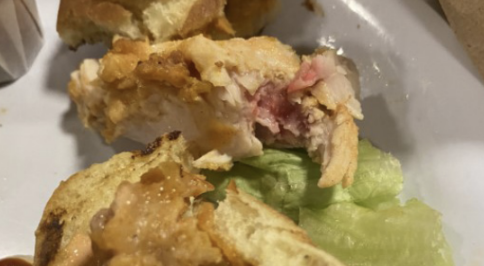A school-wide email was recently sent out to the college addressing the food quality provided at Davison Dining Hall. The photos provided by a member of the Men of Color club pointed out seemingly undercooked food, prompting an email response from Resident Director of AVI Foodsystems, Esther Reed. Reed, along with several students of the college spoke with the Crier regarding the issue.
The email from the Men of Color Club was sent out to the students of Saint Anselm on Nov. 3, showing photos of steak and chicken, both being deemed undercooked. The photos included a message addressing the “reoccurrence” of the issue. Further complaints in the email address the fact that it is not solely an issue to the club, but it is a student wide issue, and it was said that adequate food is “not only a responsibility, but a standard and a right.”
An anonymous member of the Men of Color Club spoke with the Crier addressing the email that was sent, and the motivation behind sending it school-wide. The club member promptly started by saying that “this isn’t just a Men of Color issue,” and explained that the club does not want it to be perceived as so. It had just come to the club’s attention when “students texted [our] group chat, and said ‘this is probably the third time this week that my food was pink,’ ” and asked who to get in contact with.
The email promptly gained the attention of Esther Reed, the Resident Director of AVI Foodsystems. Reed’s email response immediately addressed Dining Services’ value of student concerns, and Reed said “we immediately investigated each item addressed in the initial email.” The email response then followed with an in-depth explanation of the meat at Davison and the process of cooking and preparing it, and Reed said “we have conducted training with our grill team to ensure this does not happen in the future.”
Reed also followed up with the Crier after the email was sent, to thoroughly explain the steps that were taken to address the discrepancies. Regarding the training of the grill team, Reed said “food safety training is conducted by our managing staff on a consistent basis,” and that “in the past couple of weeks we have been training our new grill team members by having a manager work side-by-side with them.” Food safety training is taken extremely seriously by Dining Services, and well-planned training takes place to help ensure the food is safe for students to eat.
In the supposed cases of food-borne illness due to the food provided at Davison, Reed addressed those concerns and said “we have had two cases of this in the past and both were immediately addressed and rectified…most of the ‘undercooked’ complaints have not been valid.” Though students have had complaints about food poisoning, Reed assured that the meat was not undercooked nor was the cause of the illnesses.
Though concerns about illness were rectified by Reed, two students spoke anonymously with the Crier about their experiences with food-borne illnesses from the food at Davison. One of the students said “I ate the grilled chicken from the clarity station, and both times I got sick from it.” The other student added, “it’s always the meat for some reason…I was so violently ill.” Both students were confident that it was definitely food poisoning and definitely from the food at Davison.
The two anonymous students continued with addressing their major concerns with food discrepancies at Davison and contacting Dining Services about it. One of the students said “Dining Services make it kind of intimidating for you to bring up your concerns with people,” which was a major factor in their appreciation for the email sent from the Men of Color club. This student said “I was kind of glad that they sent out an email where people felt comfortable voicing their opinion.”
The two students voiced their overall dissatisfaction with the food that is provided at Davison, and one of the students said “we need to get on top of this and tell them how we really feel.” Though disappointed with the services, it is recognized by students that communication about their concerns is essential to seeing any possible change in the food.
Reed is also advocating for stronger communication between students and Dining Services, and Reed said “we are determined to try to reach as many students as possible to have an open communication about dining on campus,” and that she is “working with with many student groups which will hopefully allow us to engage and educate students.”
With dissatisfaction coming from many students on campus, and Dining Services’ diligence to address said concerns, open communication seems to be the key to getting to the bottom of these issues. Reed wants the students to know that “as a community, I hope we can do better at communicating as I think it will help all parties understand where each is coming from.” If there are any concerns about dining on campus, speak up and voice your concerns to Dining Services.


